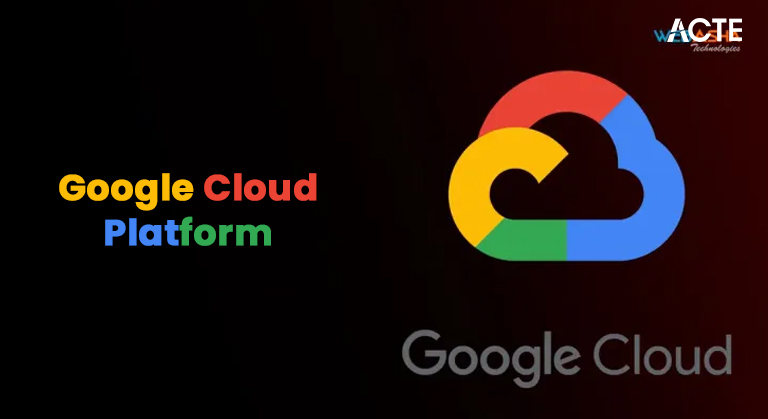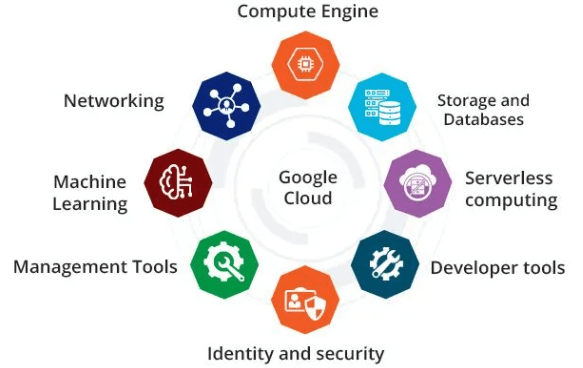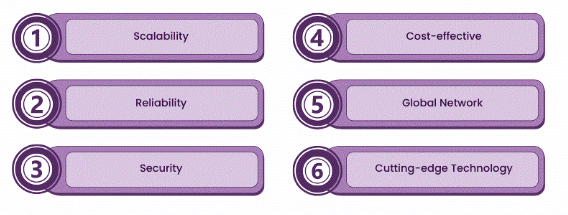
- Introduction to Google Cloud Platform (GCP)
- Key Features of Google Cloud Platform
- Services Offered by Google Cloud Platform
- Benefits of Google Cloud Platform
- How Google Cloud Platform Works
- Google Cloud vs AWS vs Azure
- Use Cases of Google Cloud Platform
- Pricing of Google Cloud Platform
- Security Features of Google Cloud Platform
- Conclusion
Introduction to Google Cloud Platform (GCP)
Google Cloud Platform (GCP) is a suite of cloud computing services provided by Google designed to help businesses and developers build, deploy, and scale applications and services on the same infrastructure that powers Google’s products, such as Google Search, Gmail, and YouTube. Launched in 2008, Google Cloud has become one of the top contenders in cloud computing, alongside Amazon Web Services (AWS) and Microsoft Azure. GCP offers comprehensive cloud-based services, allowing businesses to use advanced computing capabilities such as big data processing, machine learning, artificial intelligence, and essential infrastructure services like virtual machines, storage, and networking. Startups, enterprises, and developers widely use GCP for its strong Performance, reliability, and Innovation.
Key Features of Google Cloud Platform
Google Cloud Platform stands out for its innovative and user-friendly features, making it a powerful choice for businesses and developers. Here are some key features:
- Global Infrastructure: Google Cloud offers one of the largest and most secure global infrastructures, with data centers worldwide. This ensures low-latency, high-performance access to services no matter where users are located.
- Data Analytics and Big Data: GCP offers advanced tools for processing and analyzing large datasets, such as BigQuery (a serverless data warehouse) and Dataflow (for real-time data processing). These tools are optimized for scalability and speed.
- Machine Learning and AI: Google Cloud provides a suite of machine learning tools such as TensorFlow, AutoML, and Cloud AI, which make it easier for developers to integrate artificial intelligence into their applications without deep expertise in machine learning.
- Serverless Computing: Google Cloud’s serverless computing services, such as Cloud Functions and App Engine, let developers run code without managing infrastructure, allowing them to focus on building applications.
- Containerization and Kubernetes: Google is a pioneer of containerization and Kubernetes (open-source container orchestration). With Google Kubernetes Engine (GKE), users can quickly deploy, manage, and scale containerized applications on GCP.
- Networking and Security: Google Cloud offers cutting-edge networking capabilities, such as Cloud CDN, Cloud Interconnect, and VPC (Virtual Private Cloud), all with enterprise-grade security. Google’s infrastructure includes security tools like Identity and Access Management (IAM) and Cloud Security Command Center.

Services Offered by Google Cloud Platform
Google Cloud Platform offers many services to help businesses manage their infrastructure, develop applications, and analyze data. The core categories of GCP services include:
Compute Services:- Google Compute Engine: Provides scalable virtual machines (VMs) that run on Google’s global infrastructure.
- Google Kubernetes Engine (GKE): Managed Kubernetes service for orchestrating containerized applications.
- Google App Engine: Platform-as-a-Service (PaaS) for building and deploying web applications without managing the underlying infrastructure.
- Google Cloud Functions: Serverless functions allow developers to run code responding to events without provisioning or managing servers. Storage and Databases:
- Google Cloud Storage: Object storage service for storing large amounts of unstructured data.
- Google Cloud SQL: Managed relational database service that supports MySQL, PostgreSQL, and SQL Server.
- Google Bigtable: NoSQL database optimized for large-scale, low-latency applications.
- Google Firestore: Serverless NoSQL document database for web, mobile, and server applications. Big Data and Analytics:
- BigQuery: Fully-managed, serverless data warehouse for real-time analytics on massive datasets.
- Dataflow: Stream and batch processing service for large-scale data processing.
- Dataproc: Managed Spark and Hadoop service for big data processing and analytics. Networking:
- Google Cloud CDN: Content Delivery Network for fast content delivery to users globally. Google Virtual Private Cloud (VPC): A private network to manage and connect your Google Cloud resources securely.
- Cloud Interconnect: Provides high-performance connections between your on-premises network and Google Cloud. Machine Learning and AI:
- Google AI Platform: A suite of machine learning services for building, training, and deploying models.
- Cloud Vision API: Image analysis service that can detect objects, text, and scenes in images.
- Cloud Translation API: Real-time translation service powered by Google’s machine learning models. Developer Tools:
- Cloud SDK: Command-line interface for managing Google Cloud resources.
- Cloud Build: A continuous integration and delivery service for building, testing, and deploying code.
Benefits of Google Cloud Platform
Google Cloud Platform (GCP) provides numerous advantages for businesses and developers, making it a preferred choice for many. Scalability is a key benefit, as GCP allows users to quickly scale resources up or down based on demand, accommodating sudden traffic spikes or scaling down during off-peak periods. High Performance is ensured by leveraging the same infrastructure that powers Google Search and other high-demand applications, offering low latency, high throughput, and a reliable network. Cost-effectiveness is another advantage, with flexible pricing models that let businesses pay only for what they use, with sustained use discounts, preemptible VMs, and committed use contracts that further reduce costs. Security is robust, featuring encryption at rest and in transit, DDoS protection, and compliance with global standards like GDPR, HIPAA, and PCI-DSS. Additionally, Innovation is a strong focus, as Google Cloud provides advanced AI and machine learning tools that enable businesses to enhance applications with intelligent features such as image recognition, natural language processing, and predictive analytics.
How Google Cloud Platform Works
Google Cloud Platform works by providing developers and businesses with a set of scalable and flexible resources to build and run applications. Here’s an overview of how GCP works:
- Infrastructure as a Service (IaaS): GCP provides compute resources like virtual machines (VMs) and storage that can be provisioned on demand. You only pay for what you use, which makes it cost-efficient.
- Platform as a Service (PaaS): GCP’s App Engine is a PaaS solution that abstracts infrastructure management, enabling developers to focus purely on building and deploying their applications without worrying about the underlying infrastructure.
- Serverless Computing: Google Cloud also supports serverless computing with Cloud Functions, allowing developers to run code responding to events or HTTP requests without managing servers.
- Data Services: GCP allows you to store and analyze data at scale using tools like BigQuery, Cloud Storage, and Dataflow. These services integrate seamlessly, allowing you to store, process, and visualize data quickly.
- Machine Learning: With services like Google Cloud AI Platform and AutoML, businesses can train custom machine learning models or leverage pre-built models from Google’s AI technologies for tasks such as image recognition, language translation, and speech recognition.
- API Integration: GCP allows easy integration with other APIs and services within Google Cloud and externally. This helps businesses connect their applications with third-party services or Google’s suite of services.
Google Cloud vs AWS vs Azure
While Google Cloud competes directly with AWS (Amazon Web Services) and Microsoft Azure, each platform has strengths. Here’s a comparison of the three:
| Feature | Google Cloud Platform (GCP) | Amazon Web Services (AWS) |
|---|---|---|
| Compute Services | Compute Engine, Kubernetes Engine, App Engine | EC2, ECS, Lambda |
| Storage | Cloud Storage, Bigtable, Firestore | S3, RDS, DynamoDB |
| Machine Learning | AutoML, AI Platform, TensorFlow | SageMaker, Rekognition |
| Big Data | BigQuery, Dataflow, Dataproc | Redshift, EMR, Athena |
| Networking | Cloud VPC, Cloud CDN, Interconnect | VPC, CloudFront, Direct Connect |
Use Cases of Google Cloud Platform
Google Cloud Platform is used by businesses across various industries for different applications:
- Retail and E-Commerce: GCP’s scalable infrastructure and advanced data analytics capabilities make it ideal for handling e-commerce workloads, analyzing customer behavior, and improving user experiences.
- Healthcare: GCP’s security features and compliance with industry regulations make it a good fit for managing healthcare data and delivering AI-driven insights into patient care.
- Finance: With its powerful analytics tools, GCP helps financial institutions handle big data and gain insights into risk management, fraud detection, and market trends.
- Gaming: GCP’s high-performance computing and storage solutions make it an excellent choice for hosting multiplayer games, processing in-game data, and offering real-time analytics to improve user experience.

Pricing of Google Cloud Platform
Google Cloud’s pricing is flexible and follows a pay-as-you-go model, ensuring that users only pay for the services they use. Pay-as-you-go pricing is based on usage, including storage, computing, and networking resources. Sustained Use Discounts automatically apply to users who run services like Compute Engine continuously for a significant portion of the month, reducing costs. Committed Use Contracts allow users to commit to using specific services for more extended periods (1-3 years) in exchange for discounted rates. Additionally, Google Cloud provides a Free Tier for many services, enabling users to explore and test GCP features without incurring costs.
Security Features of Google Cloud Platform
Google Cloud places a strong emphasis on security with several built-in features to protect data and applications:
- Data Encryption: All GCP data is encrypted at rest and in transit using strong encryption protocols.
- Identity and Access Management (IAM): Allows you to define who can access what resources, ensuring that only authorized users have access.
- Compliance: GCP complies with significant standards, such as GDPR, HIPAA, SOC 2, and PCI-DSS, to help organizations meet regulatory requirements.
- Security Monitoring: Tools like Google Cloud Security Command Center provide real-time threat detection and vulnerability assessments for your Google Cloud environment.
Conclusion
Google Cloud Platform (GCP) is a powerful cloud computing service that enables businesses and developers to build, deploy, and manage applications on Google’s global infrastructure. With its strong emphasis on scalability, performance, machine learning, and security, GCP provides a comprehensive solution for organizations of all sizes. Whether you’re looking for cutting-edge AI tools, real-time data analytics, or high-performance computing resources, GCP offers a variety of services tailored to meet the demands of modern enterprises and developers.





